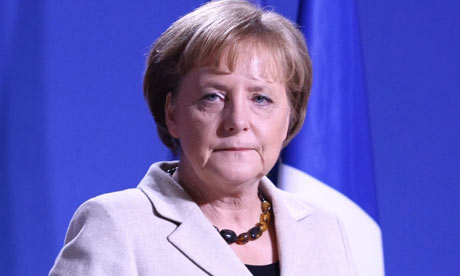See also:
– The Solution For Greece (Max Keiser, Matt Taibbi and Catherine Austin Fitts)
Market Turmoil Hits The Euro And Adds to Fears of Economic Collapse in Greece

Some European leaders, including Angela Merkel of Germany, have said that Greece should have to borrow money at market rates. (Photo: EPA)
The Greek debt crisis deepened today, despite reassurances from European Union officials that the country was not on the brink of default.
Financial markets ignored European Central Bank President Jean-Claude Trichet’s comments that “a default is not an issue for Greece,” and continued their bond sell-off for a third day.
The yield on Greek bonds – which the country needs to pay to fund its schools, hospitals and other public spending – rose to 7.35%, almost twice as much as Britain’s. This puts more pressure on Greece, making its financing practically unsustainable. Investors want more details about a potential bailout package, something that the EU has so far failed to provide, dragging the crisis into its fourth month.
“It’s like game theory,” said Michael Krautzberger, head of European fixed-income at Blackrock, whose team manages $50bn (£33bn) in bond funds. “At the beginning of the crisis, the EU didn’t want to give help too quickly because they wanted to pressure Greece to cut their budget, but now we have reached a point where it’s clear they need the help. For a few weeks, we thought maybe they don’t need the help, now we have passed that point, the yields are now too high to stay too long.”
The premium that investors demand to buy Greek bonds soared to 440 basis points over German bunds, the highest since the euro was created a decade ago. The cost of insuring $10m of Greek debt leapt to a record $470,000, from $410,000 on Wednesday, before settling back at about $435,000, according to Markit data. That is more than four times the price paid for Britain’s debt protection.
The turmoil sent the euro and European equity markets lower, as a collapse of the Greek economy could have a domino effect on other southern European countries, such as Portugal. The euro weakened to $1.328, although it recovered slightly after Trichet’s comments, trading near $1.334. All major European stock indexes lost about 1%.
“Greece continues to look like a slow-motion train crash,” Steve Barrow, analyst at Standard Bank, said. “The crash has not occurred yet but it is coming. Efforts to avoid a crash seem doomed to failure, whether it is emergency loans or some other initiative. As the crisis plays out, so bond spreads are likely to widen much further and the euro fall much more.”
The so-called bond vigilantes, or activist bond investors, want more clarity about what interest Greece should pay on any potential bailout loan, something which still divides EU officials. Led by German Chancellor Angela Merkel, some leaders say Greece should have to borrow at market rates.
“Countries like Germany know they have to help, but they would like to postpone it as much as possible as they have local elections in May and it’s not necessarily popular,” Krautzberger said. “Everyone would have been better off if they had been quicker, and Germany has a role here – things like local elections should not play such a role here.”
Greece admitted this week that its budget deficit would need to be revised up, to more than 12%, the highest in the EU. Greek banks have also asked for further funding as savings have fallen, driven by a capital flight. Investors are especially worried as Greek banks have been the biggest buyers of Greek bonds recently.
“With or without support from the EU, the bottom line remains that after years of fiscal mismanagement the market has little confidence that Greece can swallow the necessary austerity measures and slash its budget deficit,” said Jane Foley, director of research at Forex.com. She said: “The debt financing crisis for the Greek government is closer to boiling over.”
Greece needs to raise another €35bn (£31bn) this year to refinance its debt, of which €10.5bn must be raised by the end of May. The country says it has already met its April financing needs, but plans to meet US investors from 19 April in a US tour, aiming to raise $5bn.
In the meantime, investors are urging the EU “to see it’s necessary to help, and that we won’t gain anything by postponing it another three to four weeks,” Krautzberger said. “We have to accept the EU is a very complex institution and everything takes a long time. But the longer it takes, the bigger the package. The EU has to start walking the walk.”
Elena Moya
Thursday 8 April 2010 20.11 BST
Source: The Guardian